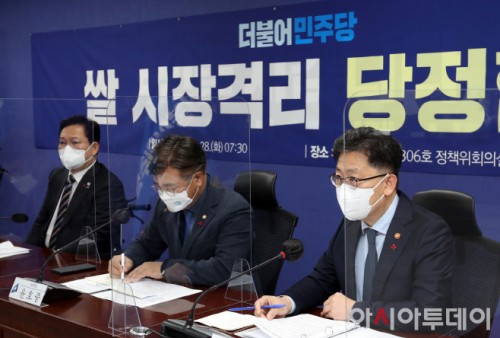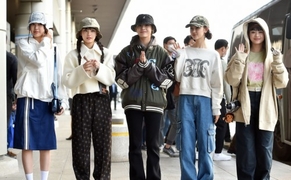 |
| Agriculture, Food and Rural Affairs Minister Kim Hyun-soo speaks during a policy coordination meeting at the National Assembly on Dec. 28, 2021./ Photographed by Jung Jae-hoon |
AsiaToday reporter Jeong Geum-min
The ruling Democratic Party (DP) and the government decided to buy 200,000 tons of rice in January. The move is aimed at stabilizing the market price of the staple grain as some 268,000 tons of rice has been overproduced this year.
DP chief policy maker Park Wan-joo announced the decision Tuesday in a press briefing following a policy coordination meeting at the National Assembly.
This year’s rice production reached 3.87 million tons, up 10.7 percent from a year earlier. Due to the oversupply, rice prices have fallen sharply. The average price for a 20-kilogram sack of rice stood at 51,254 won (US$43) as of Saturday, down nearly 10 percent from 56,803 won on Oct. 5, according to the authorities.
The government decided to “isolate” 200,000 tons of rice from the market in January, and will watch the market situation to determine when it will purchase the remaining 70,000 tons. It has taken into account the unstable factor that the purchase of the entire surplus amount of rice could encourage inflation. The Ministry of Agriculture, Food and Rural Affairs will announce a detailed plan for the purchase of rice in January following discussions with related parties.
The DP presidential candidate Lee Jae-myung, who has been calling for measures to isolate rice from the market, immediately welcomed the decision. “I hope the rice isolation will help alleviate the concerns of farmers,” Lee wrote on his Facebook page. “I will take care of farmers until the end so they can focus on production without worrying about the oversupply of rice.”
However, critics say such decision is aimed at winning farmers’ votes ahead of the presidential election. Rice is the most important single product and the dominant grain in Korea, accounting for about 55 percent of total cultivated area.
The government needs hundreds of billions of won to purchase the surplus amount of rice. The government budget comes from tax, after all. It paid about 620 billion won when purchasing 357,000 tons of rice in 2015 and about 540 billion won when buying 299,000 tons of rice in 2016. That’s not all. If the revenue the government collects does not reach the expected amount when releasing isolated rice to the market, the rest will have to be covered by taxes. It costs 500 million won to manage 10,000 tons of rice stock. If 200,000 tons of rice is isolated, an additional 10 billion won is needed for inventory management.
Besides, overproduction may become permanent if the government comes forward to purchase rice in a situation where per capita rice consumption is declining sharply. Excluding last year when rice production fell sharply due to the record-breaking rainy season and typhoons, the country’s rice industry has been experiencing an oversupply structure of around 300,000 tons per year.
#stabilize #rice production #oversupply
Copyright by Asiatoday
Most Read
-
1
-
2
-
3
-
4
-
5
-
6
-
7





















